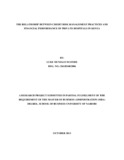| dc.contributor.author | Matere, Luke M | |
| dc.date.accessioned | 2013-11-12T11:46:23Z | |
| dc.date.available | 2013-11-12T11:46:23Z | |
| dc.date.issued | 2013-10 | |
| dc.identifier.citation | Degree in Master of Business Administration | en |
| dc.identifier.uri | http://erepository.uonbi.ac.ke:8080/xmlui/handle/123456789/58692 | |
| dc.description | A research project submitted in partial fulfillment of the requirement of the Master of Business Administration (MBA) Degree, School of Business University of Nairobi | en |
| dc.description.abstract | Credit risk is the risk that a financial institution will incur losses because the financial position of a borrower has deteriorated to the point that the value of an asset (including off-balance-sheet assets) is reduced or extinguished. Credit risk is most simply defined as the potential that a borrower or counterparty will fail to meet its obligations in accordance with agreed terms. The objective of the study was to establish the relationship between the credit risk and financial performance of private hospitals in Kenya.
In this study, causal study design was used. The objective of causal research is to test hypotheses about cause-and-effect relationships. The population of this study comprised of all licensed private hospitals in Nairobi. Currently there are about 50 licensed private hospitals according to Kenya Medical Practitioners and Dentists Board Committees 2010 database. The researcher used both primary and secondary data. Primary data was obtained through self-administered questionnaires with closed and open-ended questions. A 5-point likert scale was used to determine the impact of credit management practices on performance of private hospitals in Kenya. Descriptive statistics such as means, standard deviation and frequency distribution were used to analyze the data. Data presentation was done by the use of pie charts, bar charts and graphs, percentages and frequency tables. This ensured that the gathered information is clearly understood. SPSS version 17 was used in capturing and building the data and thereafter analyzed through the use of regression analysis.
The findings were that private hospital considers risk identification as a process in credit risk management. Credit risk management procedures can be used to influence profitability of the private hospitals and recommends the management of the private hospitals to oversee facilitation of credit risk management as a substantial degree of standardization of process and documentation.
In addition, the study concludes that director's report on risk monitoring enables the private hospital management to discover mistake at early stage and make sure that risk management practices are in line with proper risk monitoring. | en |
| dc.language.iso | en | en |
| dc.publisher | University of Nairobi | en |
| dc.title | The relationship between credit risk management practices and financial performance of private hospitals in Kenya | en |
| dc.type | Thesis | en |
| local.publisher | School of Business | en |

